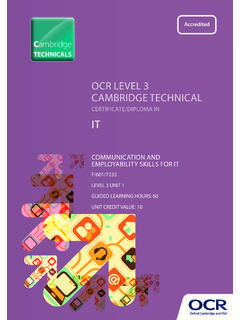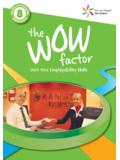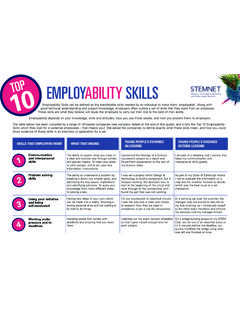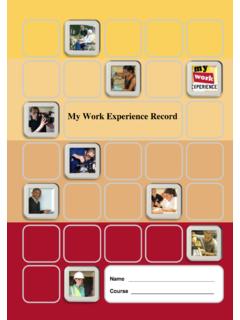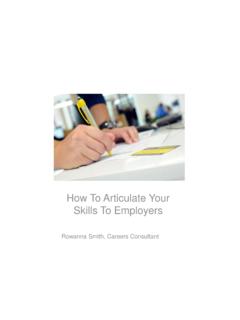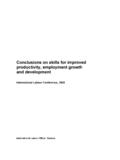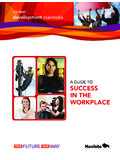Transcription of Employability skills - ACAL
1 DE P A RT M E N T OF ED U C A T I ON, EM P LOY M E N T A N D WORK P LA C E RE LA T I ON S Employability skills AND ATTRIBUTES FRAMEWORK BACK GR OUND PAPER AUG US T 2011 Employability skills and Attributes Framework Project Background Paper 2 PURPOSE OF THIS PAPER This paper forms part of a Department of Education, Employment and Workplace Relations (DEEWR) funded project to research, develop and implement a nationally accepted, cross-sectoral framework that will describe and measure Employability skills and associated personal attributes. It provides an overview of insights gathered through the project to date, sets out a number of proposals for the content and structure of the framework and poses questions for further discussion.
2 The paper provides the background to a series of public consultations being conducted across the country in August 2011. These consultations are the final stage of a scoping process for the framework and will result in a set of recommendations for its further development. The framework is intended to be a resource that can be used across a broad range of contexts. It will be applicable across industries, education and training sectors and employment settings. It will also complement the Australian Core skills Framework (ACSF) and support the work being undertaken under the National Foundation skills Strategy for Adults. WHAT WE VE LEARNT SO FAR The current situation Conceptions of Employability skills have been around in Australia in one form or another for twenty years.
3 Recently there has been an increased focus on these skills , both nationally and internationally, and a move towards making them more prominent and explicit in education and training systems. There is a wide range of terms used to describe these types of non-technical skills , including generic skills , essential skills , soft skills , key competencies , transferable skills , enterprise skills and 21st century skills . Many of the frameworks used around the world to describe these skills are also broader than those relevant to employment and include capabilities that might be described as life skills . The focus that has been adopted for this framework is the non-technical knowledge, skills and attributes required to effectively participate in the workforce.
4 In Australia, there are a number of existing arrangements that address non-technical skills (most of which are broader than those required to effectively participate in the workforce ). They include a set of General Capabilities that form part of the new Australian Curriculum for schools, the Employability skills Framework used in the Vocational Education and Training sector, differing collections of Graduate Attributes developed by universities, the Australian Core skills Framework, a cross-sectoral framework for addressing language, literacy and numeracy skills and the Australian Blueprint for Career Development, which addresses career management competencies.
5 The Australian Qualifications Framework, which spans all education and training sectors, captures these skills under four broad categories of Generic skills : Basic fundamental skills , such as language, literacy, numeracy and ICT literacy skills People skills , such as being respectful to others, communication, team working skills Thinking skills , such as analytic, problem solving, synthesis, creativity and learning skills Personal skills , such as self management, cultural understanding, having a global perspective and acting with responsible, ethical behaviour. Whilst the details of each of these frameworks vary, there is great similarity in the types of skills that they cover (which is also true of other frameworks in use internationally).
6 Employability skills and Attributes Framework Project Background Paper 3 Despite widespread agreement of the importance of these skills and attitudes in the workplace, the literature highlights significant uncertainty and scepticism about teaching and assessing them in a valid and ethical way. A range of issues, including differing definitions and interpretations, differing levels of abstraction, and at the delivery end, differences in confidence in and/or commitment to teaching these skills , appear to have prevented the full integration of Employability skills into our education and training systems. From our consultations To date, we have spoken with around 150 people, including employers from a range of industry sectors (who form the majority of those consulted), and representatives of industry peak bodies, schools, vocational education and training providers, higher education institutions, employment service providers, community organisations and relevant government agencies.
7 There was general agreement that although many of the skills that assist someone to gain, retain and be successful in employment may also be applicable to other areas of life, the framework should focus on the role they play in relation to employment. The consultations have also told us that a new, cross-sectoral framework could provide benefits for a broad range of potential users. Of particular value would be the creation of a common language around Employability skills and the establishment of clear benchmarks for addressing them. The consultations identified that the framework could provide a means of articulating and clarifying expectations about what is appropriate or necessary at different stages of a career in various organisations and industries, and that it might help to reinforce the value of skills that are otherwise often taken for granted.
8 It could also provide the basis for tools and resources that could: assist individual job seekers and those looking for promotion to identify their strengths and areas for improvement assist employers (especially SMEs) with recruitment processes, workforce development strategies and support for employee development provide better information to those working with job seekers, to enable better matching of work and training opportunities support the three education and training sectors in the design of curricula/ methodologies/support structures that prepare individuals for employment or further develop their employment-related knowledge and skills improve accountability of funded programs through measurement and reporting of outcomes.
9 In our discussions, many have told us that the non-technical skills most in demand by employers now are the same as those required by employers 50 years ago, and that it is simply the level of priority placed on particular skills that changes across contexts. The idea of having a framework that is relevant across different stages of an individual s working life, and at different levels of skill complexity, is one that seems to have resonance. Unlike many of the performance and development frameworks used in large organisations, none of the existing generic or Employability skills frameworks we have examined incorporate distinctions between levels of skill.
10 Consultations have told us that a framework which uses different levels of performance (similar to the approach adopted by the ACSF, which identifies five levels of performance in literacy and numeracy skills ), would assist in measuring individuals progress in their development of employment-related skills . However, many also cautioned that the ability to measure individuals skill levels could be misused to create a barrier to employment for some, and that this should be avoided at all costs. Employability skills and Attributes Framework Project Background Paper 4 The question of whether attributes or attitudes have a place in the framework has created the greatest level of debate in conversations so far.



